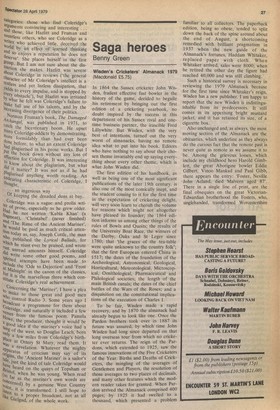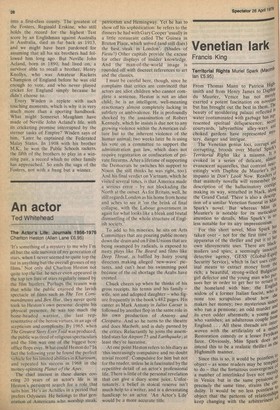Saga heroes
Benny Green
Wisden's Cricketers' Almanack 1979 (Macdonald £5.75) In 1864 the Sussex cricketer John Wisden, frailest effective fast bowler in the history of the game, decided to beguile his retirement by bringing out the first edition of a cricketing yearbook, no doubt inspired by the success in this department of his Sussex rival and one time business partner, the irascible Fred Lillywhite. But Wisden, with the very best of intentions, turned out the very worst of almanacks, having no remote idea what to put into his book. Editors who have nothing to say about their cho sen theme invariably end up saying everything about every other theme, which is what John Wisden did.
The first edition of his handbook, as well as being one of the most significant publications of the later 19th century, is also one of the most comically inept, and the student coming to it for the first time in the expectation of cricketing delight, will very soon learn to cherish the volume for reasons which might not altogether have pleased its founder; the 1864 edi tion informs us among other things of the rules of Bowls and Quoits; the results of the University Boat Race, the winners of the Derby, Oaks and St Leger since 1780; that 'the graces of the tea-table were quite unknown to the country folk'; that the first European entered China in 1517; the dates of the foundation of the Archeological, Astronomical, Geological, Horticultural, Meteorological, Microscopical, Ornithological, Pharmaceutical and Philological societies; the length of the main British canals; the dates of the chief battles of the Wars of the Roses; and a disquisition on the constitutional implications of the execution of Charles I.
To be fair, Wisden made a rapid recovery, and by 1870 the almanack had already begun to look like one. Once the Pardon brothers took over in 1887 its future was assured, by which time John Wisden had long since departed on that long overseas tour from which no cricketer ever returns. The reign of the Par dons, which extended to 1925, saw the famous innovations of the Five Cricketers of the Year. Births and Deaths of Crick eters, the mingling of the averages of Gentlemen and Players, the resolution of those averages to two places of decimals, and many other features which the mod ern reader takes for granted. When Pardon arrived the Almanack comprised 400 pages; by 1925 it had swelled to a thousand, which presented a problem familiar to all collectors. The paperback edition, being so obese, tended to split down the back of the spine around about the end of August, a shortcoming remedied with brilliant pragmatism in 1937 when the new guide of the Almanack's fortunes, Haddam Whitaker, replaced paper with cloth. When Whitaker arrived, sales were 8000; when he retired the other day the figure had reached 40,000 and was still climbing.
Such a historical survey is necessary in reviewing the 1979 Almanack because for the first time since Whitaker's reign, Wisden has a new publisher. I am happy to report that the new Wisden is indistinguishable from its predecessors. It still comes in its appetising bright mustard jacket, and it has retained its size, of a cigarette box.
Also unchanged and, as always, the most moving section of the Almanack are the obituaries, which underline as they always do the curious fact that the remote past is never quite as remote as we assume it to be. Among the grievous losses, which include my childhood hero Harold Gimblett, the great Aborigine bowler Eddie Gilbert, Vinoo Mankad and Paul Gibb, there appears the entry: 'Foster, Neville John Acland, died Malvern aged 87'. There in a single line of print, are the final obsequies on the great VictorianEdwardian brotherhood the Fosters, who, singlehanded, transformed Worcestershire into a first-class county. The greatest of the Fosters, Reginald Erskine, who still holds the record for the highest Test score by an Englishman against Australia in Australia, died as far back as 1913, and we might have been pardoned for assuming that all his six brothers had followed him long ago. But Neville John Acland, born in 1890, had lived on, a survivor able to recall a brother, Henry Knollys, who was Amateur Rackets Champion of England before he was old enough to vote, and who never played cricket for England simply because he didn't choose to.
Every Wisden is replete with such touching moments, which is why it is very much more than a sporting handbook. What might Somerset Maugham have made of Neville John Acland's life, with its cricketing promise interrupted by the sterner tasks of Empire? Wisden says of him, 'Later he captained the Federated Malay States. In 1908 with his brother M.K., he won the Public Schools rackets, the fifth of the brothers to play in a winning pair, a record which no other family has approached.' So ends the saga of the Fosters, not with a bang but a winner.







































 Previous page
Previous page